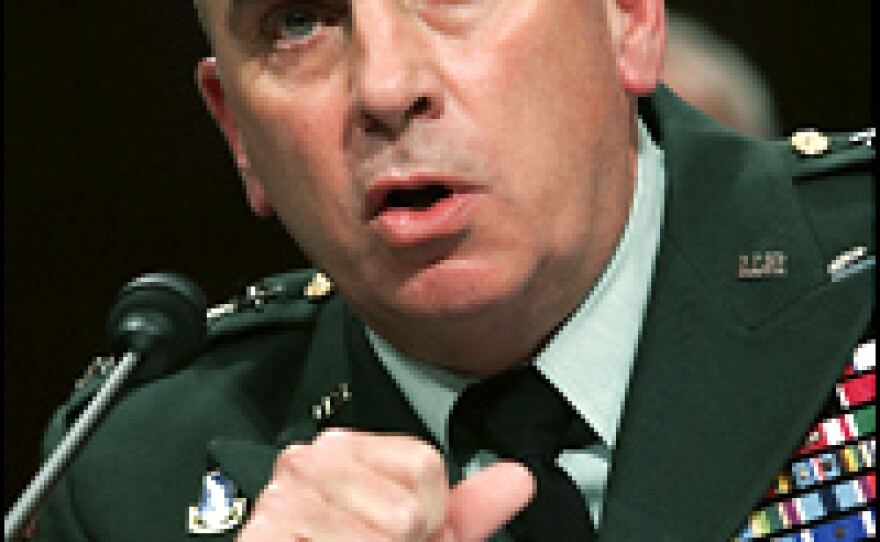
Gen. John Abizaid tells a Senate panel that the status quo in Iraq is not acceptable. But more U.S. troops might be needed, at least temporarily, to train Iraqi forces, Abizaid said.
The general also discouraged calls for a timetable to withdraw. Abizaid, the top U.S. commander in the Middle East, said the security situation in Iraq is improving -- and he does not see a need for more U.S. combat troops.
Abizaid told the Senate Armed Service Committee that a key to success in Iraq is to increase the size of the Iraqi forces, not U.S. troops. He said the Iraqis have to do it for themselves. "I believe in my heart of hearts that the Iraqis must win this battle with our help," Abizaid says. "We can win with the Iraqis if we put our effort into the Iraqis as our first priority, and that's what I think we should do."
Abizaid proposed beefing up the size of the American training teams. There are now about 4,000 soldiers and Marines taking part in the training effort, mostly in 11-man teams. That action alone, he says, may temporarily boost the level of U.S. forces, now at 152,000.
There are about 315,000 Iraqi security forces that the Pentagon says are trained and equipped. But commanders on the ground say Iraqi units are undermanned and not well equipped. And in some cases, they have been infiltrated by sectarian militias.
Abizaid said violence has eased somewhat, and American and Iraqi troops are working closely together. He also told the senators that the Iraqi government must reach out to the Sunni minority and curb militia groups.
But both Democrats and Republicans were skeptical of what Abizaid said. They pointed to the continuing violence: Last month, 104 American servicemen died, the highest toll in nearly two years. And just this week, dozens of Iraqis were kidnapped in broad daylight by men wearing Iraqi police uniforms.
At the same time, a senior military intelligence official tells NPR that without major progress in Iraq, the security situation there will continue to deteriorate over the next six months.
Sen. John McCain (R-AZ) has pressed for sending as many as 20,000 more American troops to Iraq. He said the restive Sunni province of Anbar is still not under Iraqi government control and he told Abizaid he doubted that things were getting better.
"It's not encouraging to those of us who have heard time after time that things are quote progressing well, that we're making progress, etc.," McCain said, "because we're hearing from many other sources that that's not the case. And I'm of course disappointed that you're advocating the status quo here today."
"Well senator, I agree with you," Abizaid replied. "The status quo is not acceptable, and I don't belive what I'm saying here today is the status quo. I am saying we must significantly increase our ability to help the Iraqi army... I don't think that's the status quo, I think that's a major change."
And as Abizaid plots the way ahead, Sen. John Warner (R-VA), the committee chairman, offered a sobering milestone: By Nov. 26, the American effort in Iraq will have exceeded America's involvement in World War II.
Copyright 2022 NPR. To see more, visit https://www.npr.org. 9(MDAzMjM2NDYzMDEyMzc1Njk5NjAxNzY3OQ001))






